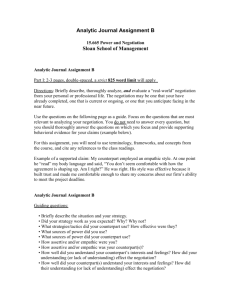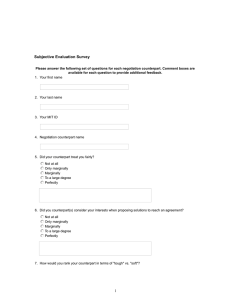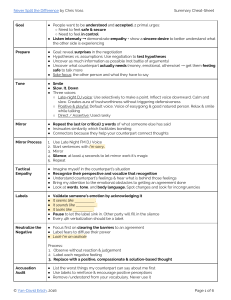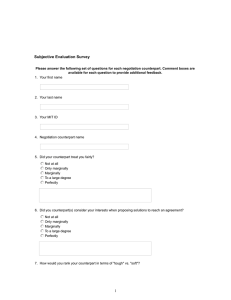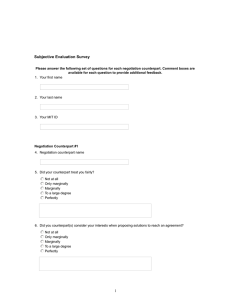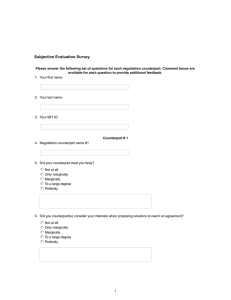Document 13297511
advertisement
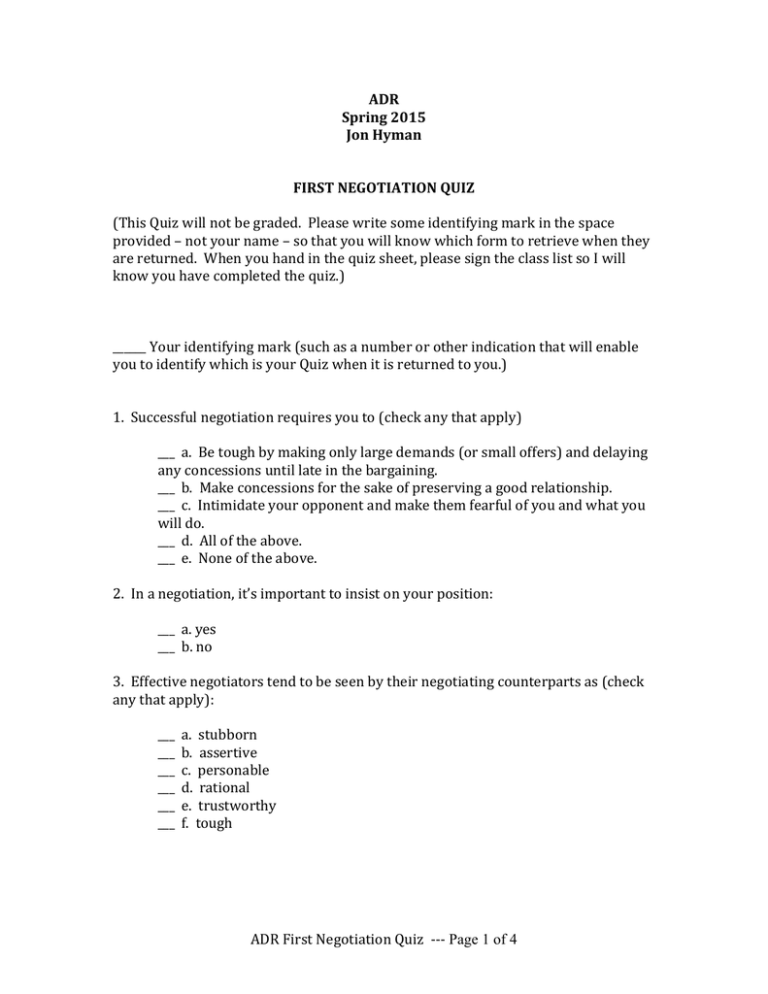
ADR Spring 2015 Jon Hyman FIRST NEGOTIATION QUIZ (This Quiz will not be graded. Please write some identifying mark in the space provided – not your name – so that you will know which form to retrieve when they are returned. When you hand in the quiz sheet, please sign the class list so I will know you have completed the quiz.) ______ Your identifying mark (such as a number or other indication that will enable you to identify which is your Quiz when it is returned to you.) 1. Successful negotiation requires you to (check any that apply) ___ a. Be tough by making only large demands (or small offers) and delaying any concessions until late in the bargaining. ___ b. Make concessions for the sake of preserving a good relationship. ___ c. Intimidate your opponent and make them fearful of you and what you will do. ___ d. All of the above. ___ e. None of the above. 2. In a negotiation, it’s important to insist on your position: ___ a. yes ___ b. no 3. Effective negotiators tend to be seen by their negotiating counterparts as (check any that apply): ___ a. stubborn ___ b. assertive ___ c. personable ___ d. rational ___ e. trustworthy ___ f. tough ADR First Negotiation Quiz -­‐-­‐-­‐ Page 1 of 4 4. A Game of X and Y (I apologize in advance for the detail. Bear with it. It relates to how to act strategically in an effective manner.) Let’s say that if you and a counterpart can each take either Action C or Action D. If you both take Action C, you will each make $100. If you take Action C, but your counterpart takes Action D instead, then you will get nothing, and your counterpart will make $200! So you’ve lost the $100 you could otherwise have if you both took Action C. But you have an opportunity to score big yourself! If your counterpart takes Action C, hoping for the payout of $100 each, but you take Action D instead, then you will collect the entire $200! So wouldn’t it be a good idea to take Action D? It depends on what your counterpart does. Certainly if they take Action C you’ve seized the big reward. But if they also take Action D, then you will each only get $20. You haven’t gotten your $200, and you haven’t even gotten the $100 you could get if you both were to take Action X, instead. If your counterpart is thinking the same way as you, won’t they will also want take Action D, hoping that you will take Action C and they will collect the $200 and you will collect nothing. But if you both take Action D, each angling for the $200 payoff for yourselves, each of you will only get $20. Here’s the payout in table form: Counterpart chooses C Counterpart chooses D You choose C You: $100; They: $100 You: $0; They $200 You choose D You: $200; They $0 You: $20; They: $20 You might say that Action C is to Cooperate, and Action D is to Defect. ADR First Negotiation Quiz -­‐-­‐-­‐ Page 2 of 4 Imagine that you will play this game several times in succession, but you can’t talk to your counterpart or otherwise communicate about whether you will take Action C or D the next time you act. For your first move, will you take Action C or Action D? Remember, i. If you take Action C and your counterpart does too, you will each collect $100. ii. But if you take Action C and your counterpart takes Action D, instead, you get nothing. iii. If you take Action D and your counterpart takes Action C, you collect $200!!! iv. If you take Action D and your counterpart also takes Action D, you collect only $20. What will you do? a. Your first move (check one): ___ Action C ___ Action D b. After you’ve made the first move and seen the payouts, it’s now time for the second move. What will it be? (Check one): ___ Action C ___ Action D ___ Can’t choose yet – it depends on the first move. Explain: 5. The Negotiator’s Dilemma refers to the choice negotiators face between, on the one hand, bargaining hard and, on the other, making concessions for the sake of preserving a good relationship. ___ a. true ___ b. false ADR First Negotiation Quiz -­‐-­‐-­‐ Page 3 of 4 6. A negotiator’s Reservation Value means terms of agreement that are equivalent to – no better for the negotiator and no worse – than what the negotiator could achieve by choosing the alternative to agreement. (For example, if the dispute involves a lawsuit, the no-­‐agreement alternative would be to continue the litigation and bear the costs of continued litigation and ultimate outcome. If the matter involves a transactional negotiation, the no-­‐agreement alternative would be continuing your current actions without any agreement, or making a substitute agreement with a third party.) ___ a. true ___ b. false 7. Speaking persuasively, by speaking forcefully, is more important for effective negotiation than is listening. ___ a. true ___ b. false 8. People tend to be realistic, or maybe even a little too pessimistic, when they think about how well they will perform in the future and what success they will have. ___ a. true ___ b. false 9. When someone is presented with a choice between A and B, they might see A as an opportunity to make a gain as compared with B. Or instead they might wish to choose A in order to avoid a loss that they would incur if they were to choose B instead of A. Let’s assume that in either situation A has the same objective value, whether one sees it as obtaining a gain or sees it as a way to avoid a loss. Since A has the same objective value, will the chooser be equally likely to choose A in either situation, whether it seems like a gain or seems like a way to avoid a loss? Check the best answer: ___ a. equally likely to choose A over B, whether A is seen as gain or as a way to avoid a loss. ___ b. more likely to choose A over B when A is seen as a way to capture a gain than when it is seen as a way to avoid a loss. ___ c. more likely to choose A over B when A is seen as a way to avoid a loss than when it is seen as a way to capture a gain. ADR First Negotiation Quiz -­‐-­‐-­‐ Page 4 of 4


